BBC News, Harare
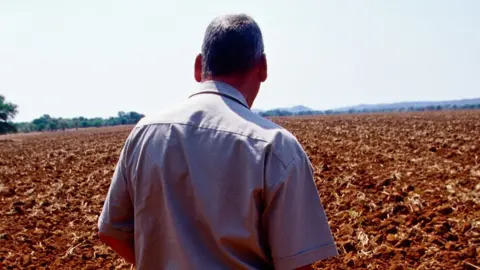 Getti images
Getti imagesThe fourth century after their land was seized during the Haotic Land reform program that made global headlines, a small group of white Zimbabwejski farmers accepted the government’s controversial compensation.
Once the backbone of the agricultural sector in the country, many of them are now older, visibly fragile, struggle for combat and financially desperate.
“I believe that is the only opportunity. We can’t wait 10 years for another deal,” said the 71-year-old Arthur Baisley BBC.
They still recover from the back, G. Baisley was among those who arrived earlier this year in the conference room in the capital, Harare – some help walking with sticks and walking frames – to discuss the agreement.
The catch is that these farmers are now paid only 1% of total cash compensation – the rest is issued as a treasury bonds in the amount of US dollars they mature in 10 years – with 2% interest paid twice a year.
The land reform program, caused farms in white-owned farms, and then in 2000. year, which was desperately that desperately moved political support at the time when Zimbabwa had about 2,500 white farmers during the country.
They attacked became the largest modern revolution of Africa modern revolution and should be corrected by colonial-ersko land, when black people were forced to leave their country. But it set the country on the path of a collision with western nations – monitored economic sanctions, which are caused by companies and the economy collapsed.
This compensation agreement was pushed by Mugabe’s president of the heir of Emmerson Mnangagva, who wants to fix the fences. The money is given to farmers, as determined by the Constitution, is the infrastructure and improvements of buildings and dams, and not the value of the Zimbabwe, which insists is illegally confiscated from the original inhabitants of the country.
All in all this is estimated at a total of $ 3.5 billion ($ 2.6 billion). However, recent payment of money was only $ 3.1 million for 378 farms.
Mr. Baisley said it was not the best job, but it was quite fair – and his decision to accept that there was realization that the downloads could not be undone.
“It was hard for my family in the beginning, but life goes on,” he said, adding that he would immediately sell some of the bonds immediately to compensate for medical accounts and take care of his sick parents.
It is a significant shift, softening of hard lines that have previously attracted both sides.
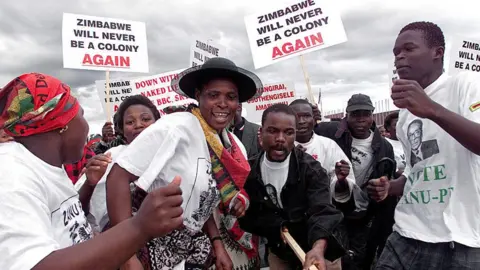 AFP / Getty Images
AFP / Getty ImagesMugabe once abolished the medicine on party gatherings, saying that white farmers should go to Great Britain, former colonial authority, for their compensation – although he paid quietly, he chose farmers quietly.
In the meantime, white farmers insisted on the entire $ 10 billion settlement. Both sides settled on a 3.5 billion dollar figure.
However, unlike Mr. Baisleija, most white farmers are held for an agreement that would see all cash paid in advance.
Deon Theron, who was in 2008, was forced to the farm he bought after independence, leads more than 1,000 farmers who refused the offer.
The boxes of his property, hecticized during his departure, still filling the veranda of his harare where he told me that the agreement was not fair because there was no guarantee that bonds would be honored in 10 years.
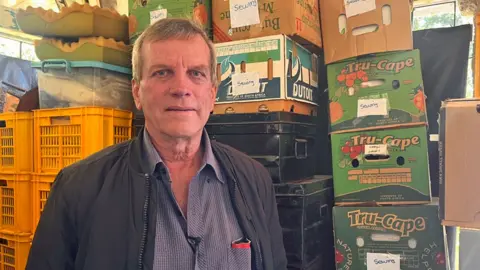
The 71 year old said that the government did not have money – and he wanted to see the international community, including the United Kingdom, as the government refused to lubricate himself to keep the government to be rejected or even satisfied.
“British can’t sit in the pavilion and watch what happens, because they’re part of it. They are connected to our history. I can’t get away from it,” he said he told BBC.
The agreement mediated that it was largely that in the UK financially supported the land of finance – but in the end of the 1990s lasted in the 1990s.
The need to re-examine Britain to compensation was a batten cry of many war veterans that led invasion on farms. They fought in the 1970s war against the rule of the Bela Minority – and felt a lowered slow pace of land reform after independence.
But like white farmers, war veterans are also divided in relation to government handling.
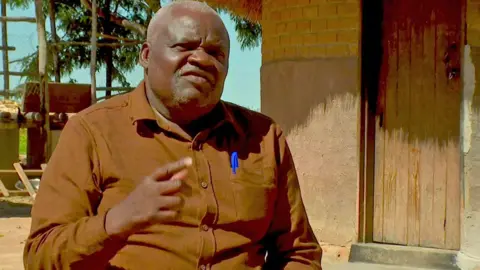
One fraction sues the government for “betting” agreed to pay $ 3.5 billion fees, saying the offer should agree in parliament.
One of his leaders, Godfrei, said, said that the countless economic challenges of Zimbabwa’s skin Zimbabwe should not have priorities of white farmers.
“It’s such a colossal amount … for the nation of our size. People suffer hard, hospitals have nothing, and then we have an unnecessary act of imagination, it is an unnecessary act of imaginations.
Another lawsuit provokes a aspect of new land policy that requires new farmers to pay the land to obtain parts of the irritation to make land owner.
After redistribution, 250,000 people who replaced 2,500 white farmers only had the right to a 99-year-old lease. However, that meant was almost impossible to get bank loans because their mandate security was not guaranteed.
Last year, the Government said that farmers can report to possess their land – with works of title rights – but they should have pay between 100 and 500 dollars per hectare (2,47 hectares).
That money will move on to the agreement on compensation for white farmers, in line with the government.
Those who cause these say they forced black farmers to redeem the country with the opposing law effectively.
And the black farmers themselves are divided due to the question.
The land reform program had mixed results. Many new farmers did not successfully have skills, finance and work to be successful on farms. But the country’s agricultural sector is now recovering with pockets of successful farmers.
2002. Solomon Ganie arrived on a bicycle to receive a naked ground of 20 hectares in Harare South.
It was part of the Scrap with 2,700 hectares, which was divided between 77 people.
The original year found the initial years of fight – suffering from a lack of financial and climatic shocks. But slowly through Chinese money eagle into the tobacco sector and after handing over work on their sons – and agricultural graduates in the 20s – things improved.
They built an enviable company with 200 permanent workers and expanded into dairy and livestock. They are applying for ownership of their country and in recent years, even in recent years have been in recent years from the government.
Aaron Ganie, his eldest son, said the BBC without a land reform program, his family could probably not be a farm structure in relation to the sards of the huge saws held by one family.
“I am very happy because I was honest, because we are living a good life through agriculture now. We are working more than that white guys worked in terms of the quality of tobacco and the leaf is good,” He said proudly that the 25-year-old was proudly said “.
“We invested in technology. It’s not easy. I now motivate more farmers to do a good job here,” he said.
He believes that new farmers should contribute to compensation payments, but based on the value of the infrastructure they inherited.
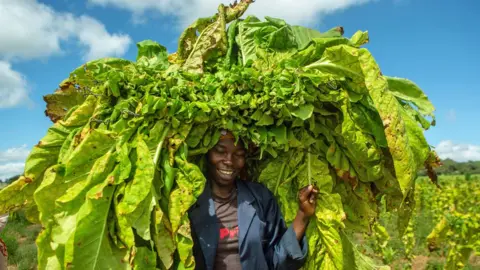 Getti images
Getti imagesAt the political front, the tensions also mitigate the UK is no longer in the sanction list that recently narko had four military and government officials who accused human rights abuses.
The United Kingdom and the Development Office for communion said that it was a BBC, this is because they were no longer in the positions held at the time in 2021 at the time. Years.
However, it is significant development, which marks the end of more than 20 years sanctions against Zimbabwe.
The country now hopes that the issue of farmers’ compensation can be properly arranged to be able to support current talks on the restructuring of its mass external debt.
There is no question that 25 years quietly returned to almost all Front of agriculture.
The farming was almost, this year, farmers sold over 300,000 tons of tobacco by auction – the highest production of tobacco ever.
But on all sides, it takes a compromise to fully skip the barrier of land reform and its relegation.
More Zimbabwe Story from the BBC:
 Getty Images / BBC
Getty Images / BBC






